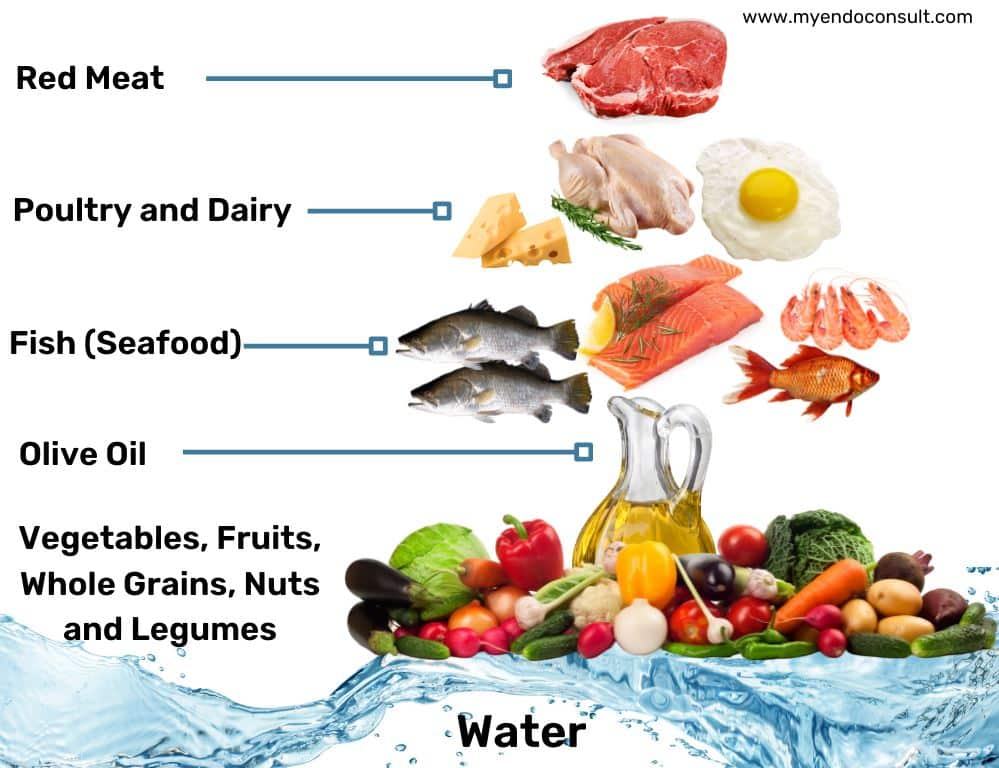The classic Mediterranean diet refers to food products traditionally consumed by people living along the coast of the Mediterranean sea. This region is bordered by various countries including Egypt, Libya, Turkey, Italy, Algeria, Albania, Malta, Morocco, Tunisia, Lebanon and Israel, to name a few.
The examples of the cuisine of this unique area of the world includes couscous, lablabi, falafel, fattoush, tombet, espetos, Greek salad, soufiko etc.
Learning Objectives
- Appreciate the typical Mediterranean dietary pattern
- Identify the Mediterranean diet pyramid
- Identify the impact of the Mediterranean Diet on cardiovascular and diabetes risk
- Understand the factors affecting sustainability of the Mediterranean Diet

What is the Mediterranean Diet “Pyramid”?
The Mediterranean diet pyramid represents the dietary pattern traditionally followed in Mediterranean countries, including Italy, Greece, and Spain. The pyramid illustrates the recommended proportions and types of foods to consume daily and weekly, aiming to promote health and prevent chronic diseases.
The Mediterranean diet pyramid emphasizes consuming plant-based foods such as fruits, vegetables, legumes, nuts, and whole grains as the foundation of the diet. It recommends moderate consumption of fish, poultry, dairy, and eggs and limiting intake of red meat and processed foods. The pyramid also includes a moderate intake of wine with meals for those who choose to consume alcohol.
In summary, the Mediterranean diet pyramid emphasizes:
- Daily consumption of plant-based foods such as fruits, vegetables, legumes, nuts, and whole grains
- Moderate consumption of fish, poultry, dairy, and eggs
- Limited intake of red meat and processed foods
- Moderate intake of wine with meals for those who choose to consume alcohol
The classic Mediterranean Diet Pyramid progresses from top to bottom as shown (also see the diagram).
- Water (either still or carbonated) is the preferred beverage. Water can be lightly flavored but not sweetened. Sugar substitutes are not recommended, not even “natural forms” of sugar.
- Fruits, vegetables, whole grains, legumes, nuts/seeds
- Olive Oil
- Moderate intake of fish
- Low to moderate intake of poultry and dairy products
- Low intake of red meat
Examples of Mediterranean Cuisine
Couscous, Lablabi, Falafel, Fattoush, Tombet, Espetos, Greek salad, Soufiko etc.
Fruits, Vegetables and Legumes
The preferred portions are at least 3 servings of vegetables a day, at least servings of fruits a day or 3 servings of legumes a day. Whole grains such as barley, whole oats, quinoa, whole oats, corn, brown rice should be kept under 3 servings a day. For tree nuts, the recommended amount is more than a serving a day.
Legumes are rich in vegetable protein, folate, and magnesium, fiber and polyphenol. Their consumption is actually linked to a reduction in incidence of fatal cardiovascular (heart) disease, as well as improvements in glucose, lipids (cholesterol), blood pressure and body weight.
Tree nuts are rich in unsaturated fats, fiber, protein, polyphenols, phytosterols, tocopherols, and non-sodium minerals. Recent clinical trial evidence suggest an improvement in insulin sensitivity (better diabetes control), LDL cholesterol (bad cholesterol), and inflammation. Less robust evidence from observational studies suggests a reduction in fatal cardiovascular disease.
Is white (refined) rice safe? Well, based on the clinical evidence, this is depends on one’s ethnicity. For example, Muraki et al reported no increased risk for cardiovascular disease in three large cohorts in the United States. On the other hand, Hu et al reported an increased risk for type 2 diabetes in 3 Asian cohorts and interestingly no increased risk for type 2 diabetes in 4 Western cohorts.
Olive oil
Olive Oil, especially extra virgin olive oil (unrefined olives which are cold pressed) is high in various polyphenols which are responsible for protection against diabetes and heart disease. Ideally, more than 4 tablespoons a day is recommended. Although even a diet with more than half a teaspoon of olive oil a day is associated with fewer cardiovascular (heart) complications in US adults.
Fish (Sea food)
Ideally fish consumption 3 times a week is recommended. There are rich in omega 3 fatty acids, zinc, selenium, iodine, B vitamins, calcium and magnesium. Low mercury fish is generally advised. These include salmon, herrings, trout, anchovies and sardines. Avoid charring fish during its preparation since this can introduce possible carcinogens into the diet.
Poultry and Dairy
Poultry should be consumed in moderation. Very large prospective studies of people in the United States suggests than eggs do not increase the risk for cardiovascular disease.
For dairy products, the suggestion is to consume fermented, low fat versions such as yogurt, soft cheese or kefir.
Meats
Processed meats including bacon, sausage, hot dogs, ham, deli meats and cold cuts should be best avoided. Same applies to butter and margarine. Additional foods that fall in this category include soda drinks (including diet versions), sweetened fruit juices, and all refined carbohydrates should be avoided.
Benefits of the Mediterranean Diet
- Helps to improve blood sugar levels (it can lead to a 0.3% reduction in glycated A1C – a test for diabetes control)
- This diet prevents diabetes even without strict restriction of calories. Up to 80% reduction in the risk of diabetes has been reported in various studies
- The Mediterranean diet results in greater than 2kg weight loss compared to low fat/low carbohydrate diets
The cost-effectiveness of the Mediterranean diet
There is a higher personal or dietary cost of approximately 1.50 US Dollar more per day than the less healthy western diet. The potential long term benefit includes a cost savings related to a reduction in risk for heart disease, diabetes and weight gain.
References
- O’Keefe JH, Torres-Acosta N, O’Keefe EL, Saeed IM, Lavie CJ, Smith SE, Ros E. A Pesco-Mediterranean Diet With Intermittent Fasting: JACC Review Topic of the Week. J Am Coll Cardiol. 2020 Sep 22;76(12):1484-1493.
- Muraki I, Wu H, Imamura F, Laden F, Rimm EB, Hu FB, Willett WC, Sun Q. Rice consumption and risk of cardiovascular disease: results from a pooled analysis of 3 U.S. cohorts. Am J Clin Nutr. 2015 Jan;101(1):164-72.
- Hu EA, Pan A, Malik V, Sun Q. White rice consumption and risk of type 2 diabetes: meta-analysis and systematic review. BMJ. 2012 Mar 15;344:e1454.
Kindly Let Us Know If This Was helpful? Thank You!



